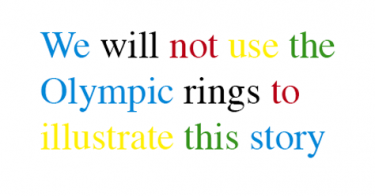Esta postagem é parte da nossa cobertura especial Jogos Olímpicos de Londres 2012 [en].

[“Nós não utilizaremos os anéis olímpicos para ilustrar essa história”] Imagem cedida por http://internationalbusinessblog.conversisglobal.com
Duane Morris do Sports Law Blog [en] disse:
For event planners and corporate entities investing as sponsors of sporting events, protection of this contracted association is one of the top intellectual property issues. The United Kingdom is taking legislative steps to bar ambush marketing. The key focus for all in this space is being clear on the rights contracted including the obligations to proactively work against ambushers. In ambush marketing there are multiple ‘victims’. First the party that paid for the official relationship with the sporting event…
Ele segue dizendo:
London 2012 is the latest to have to deal with this challenging issue. We cannot predict what ambush type activities will take place, but it is a safe bet that there will be activity in this unsanctioned Olympic sport. British legislative activity is seeking to regulate many of the past bad acts. The legislation might even be interpreted to bar clothing at venues that are seeking to deliver an advertising message.
Uma postagem no blog Olymponomics [en] afirmou:
Organizers go to great lengths to prevent businesses who are not official sponsors from associating themselves with the event. The first example of protective legislation in the Olympic context was passed for Sydney 2000 (drawing upon legislation from the Australian Bicentennial celebrations in 1988 that had provided safeguards in relation to the commercial use of symbols, words and phrases).
A postagem continua:
This highlight first of all that eye-catching ambush marketing ‘stunts’ are not necessary for firms to benefit from the illusion of perceived association with major events. It is also suggestive of a cognitive tendency of (some) individuals to view events such as the Olympics as necessarily related to global brands and commercialization, inhibiting the effectiveness of specific marketing and advertising campaigns – as the public struggle to distinguish between (different) messages in the face of an abundant supply of advertising and marketing promotions.
David Atkinson, em uma postagem no Space blog [en] completa:
For Olympic sponsors, we’re approaching the moment where their investments are coming under the greatest scrutiny, and where observers are looking to question their legacy, and whether they will be able to look back on London 2012 with pride.[..]
Despite all the means at the disposal of sponsors, including threats of litigation, this could become a battle that just can’t be won. Personally I’d like to see brands stepping away from the barrier of protection and earning recognition on their own merits. After all success at the Games won’t be measured simply in terms of eyeballs, logo views or even Facebook ‘Likes’, but through Brand Love from sporting and Olympic fans that endorses their overall contribution to the event.
Para os patrocinadores Olímpicos, está chegando a hora em que seus investimentos estarão sob análise mais minuciosa, com observadores questionando o legado e [perguntando] se eles poderão olhar para trás [para Londres em 2012] com orgulho.[..]
Apesar de todos os meios nas mãos dos patrocinadores, incluindo ameaças de judicializar a questão, esta poderia se tornar uma batalha que simplesmente não pode ser vencida. Particularmente, eu gostaria de ver as marcas se afastando dessas barreiras de proteção e conquistando o reconhecimento por seus próprios méritos. Afinal de contas o sucesso nos Jogos não será medido simplesmente em temos de visibilidade, impressões da logomarca ou mesmo de quantas pessoas curtiram no Facebook, mas sim por meio do Amor pela Marca [Brand Love] vindo dos atletas e fãs olímpicos, [amor] que valida a sua contribuição para o evento.
Em uma postagem como convidado no The Sports Bloc [en], Stephen Lownsbrough disse:
Welcome to the world of ambush marketing, otherwise known as guerilla marketing, a highly controversial but undeniably smart tactic that has been utilized by small traders and corporate giants alike in order to accrue big rewards at minimal cost from major sporting events [..]
The London 2012 Games are expected to draw millions of visitors and a global television audience in the billions. As such the rewards of official sponsorship could be immense, and companies have paid up to £ 80m to become official sponsors or partners of the Games. Equally, the forthcoming Games, like any other sporting event of this magnitude should – as least in theory – provide ample opportunity for guerilla marketing to boost the financial fortunes of savvy businesses taking advantage of the related publicity.
Bem-vindos ao mundo do marketing de emboscada, anteriormente conhecido como marketing de guerrilha, uma tática altamente controversa mas inegavelmente inteligente que foi utilizada tanto por pequenos negócios quanto por gigantes corporativos para obterem grandes lucros a um custo mínimo nos grandes eventos esportivos [..]
Os Jogos de Londres 2012 têm a expectativa de atrair milhões de visitantes e uma audiência televisiva global na ordem dos bilhões. Com isso, os benefícios do patrocínio oficial poderiam ser imensos e as companhias pagaram até 80 milhões de libras por ele ou pela parceria oficial nos Jogos. Da mesma forma, os Jogos que vêm aí, como qualquer outro evento esportivo dessa magnitude, pelo menos em teoria, deveria prover amplas oportunidades para o marketing de guerrilha para incrementar as fortunas financeiras de empresas experientes que souberem tirar proveito desse tipo de divulgação.
Ele conclui:
So in years to come who will remember that Adidas were the official sportswear partners, indeed, does anyone remember who they were in Beijing, Sydney or even Barcelona?[..] but for those fortunate to win a medal at London 2012 and the millions around the world watching or attending the Games will have the lasting image of the medals, what they ironically represented, remembering the goddess of strength, speed and victory – Nike who can sit back with a wry smile and say, ‘Image is Everything’!
Então, nos anos vindouros, quem se lembrará que a Adidas foi a parceira oficial [estampando sua marca] nos uniformes[?] De fato, alguém se lembra de quem eram os patrocinadores em Beijing, Sidney ou mesmo Barcelona?[..] mas para aqueles que tiverem a sorte de ganhar uma medalha em Londres 2012 e os milhões ao redor do mundo assistindo ou para aqueles acompanhando os Jogos nos estádios, haverá o retrato duradouro das medalhas, o que elas ironicamente representaram, lembrando a deusa da força, velocidade e vitória – a Nike poderá sentar-se com um sorriso torto e dizer ‘Imagem é Tudo’!
[Nota do Tradutor: inserimos o link para este post para contextualizar o comentário sobre a Nike].
SportsAgentBlog [en] comenta as preocupações da equipe olímpica dos EUA na postagem a seguir:
The Opening Ceremony for the 2012 Summer Olympics will take place this Friday, July 27, 2012 in London. While athletes are making their final mental and physical preparations in their eventual quest for gold, they and their representatives are also considering how they can capture marketing and brand growth opportunities throughout the Games. Unfortunately for those athletes and their reps, the US Olympic Committee (USOC) and in the International Olympic Committee (IOC) will prohibit Olympians from marketing themselves during the course of the London events. Unless, of course the athletes are marketing official Olympic sponsors.
A postagem continua:
The IOC prohibition is referred to as Rule 40, and as imagined, is less than popular among almost everyone other than official Olympic sponsors. The intention of the Rule is to attempt to alleviate sponsor concerns of ambush marketing, destroying the full value that official sponsors hope to gain from paying the large price for that status. Those sponsors, including Coca-Cola, Visa and McDonald’s pay millions of dollars to become a part of The Olympic Partner (TOP) Programme.
Anke’s Back-up Blog [en] também satiriza os mascotes dos Jogos 2012 [reproduzindo] uma imagem em seu website dizendo que a reprodução provavelmente é ilegal. [Por conta da atualização do blog, a imagem já se encontra em postagens anteriores, sendo mais facilmente acessada aqui].
Em conclusão, parece que embora o COI e o LOCOG procurem assegurar os interesses de seus patrocinadores oficiais, há preocupações dos atletas participantes e das equipes que provavelmente perderão potenciais patrocínios. Também resta saber se haverá monitoramento efetivo de táticas de emboscada que apareçam para atormentar os Jogos e seus eventos relacionados.
Esta postagem é parte da nossa cobertura especial Jogos Olímpicos de Londres 2012 [en].
Esta postagem foi sub-editada por Jane Ellis na versão em inglês.






